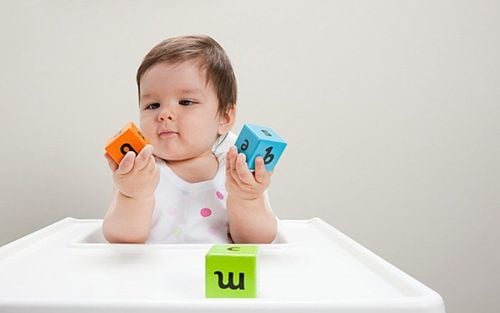This is an automatically translated article.
By the time your baby is 16 months old, he's in a state of constant activity like playing, kicking, walking, climbing, maybe even running. Some toddlers at this age are very afraid of strangers and dogs while others are mostly fearless. In this article, we will provide useful information to help parents and caregivers understand more about common behaviors in 16-month-old babies.1. Developmental milestones of 16-month-old children
Just like all children, your child is developing at his or her own pace. Here are some developmental milestones your child can achieve during this time:
Cân nặng trung bình của trẻ 16 tháng tuổi là 9.7kg và 10.5kg đối với trẻ em gái và trẻ em trai
1.1. About weight and height
According to the World Health Organization (WHO), the average weight of a 16-month-old baby is 9.7 kg for girls and 10.5 kg for boys. The average height is 78.5cm for girls and 80cm for boys.1.2. Physically
Child can climb on objects, can climb out of cot on his own Walks alone or at least can grab onto objects and walk Can walk backward and turn in circles May try to kick a ball ball with high accuracy Able to run Crawls up stairs or walks up stairs with help Child can dance Can use spoon and fork Undressing himself, straightens one's legs when dressing Knows Turn pages of books Can doodle Able to throw objects high2. Behavior in 16-month-old children and how to handle them
2.1. Angry
A child's tantrums or screaming can begin as early as 12 months of age and can last until the child is 4 years old. While every child is different and every tantrum is different, there are some basic reasons why toddlers get angryFrustration: It can be because your child doesn't understand or just doesn't like doing something what. Exhausted, Hungry, Irritated: You're upset, and so are the kids. But the difference is that you don't scream, but the young will express their feelings by shouting. Wanting to do what they like: Children sometimes throw tantrums when they want control, especially at transition times during the day, like bath time, mealtime, or bedtime. How to handle:
Make sure your child gets enough sleep: when you get enough sleep, your baby will always be sociable, and won't be too tired when playing. As a result, the child's mood will be greatly improved. Healthy foods: Giving your child a lot of sugar will make your child's mood unstable and can mean explosive temper tantrums. Therefore, choose for your child healthy foods that are rich in protein, vitamins and minerals for an empty stomach that is always filled and never exhausted. Know your child's limitations: Your child's inability to keep up with the activities you give him will lead to fatigue and inevitable tantrums. Observe your child and adjust the schedule you spend with him. Distractions: Clean up toys to avoid unnecessary collisions to limit tantrums. Prior notice: When you want your child to stop what they are doing, notify them in advance and give them time to mentally prepare.

Khi được ngủ đủ, em bé của bạn sẽ luôn vui vẻ hòa đồng
2.2. Crisis of separation
A separation crisis is a phase that toddlers all go through, but it often comes and goes and ends completely by the time the child turns three, as manifested by the child's constant desire to cling to her mother, even to the point of death. Mom can't do anything else, there are children with negative expressions that always cry and won't stop when they can't see their mother. By the time this separation crisis is over, you should try a few ways to avoid negative reactions.A common misconception is that your child won't react when you sneak out without saying goodbye the same way you put him to sleep and leave the house. When your baby wakes up, he will be upset and confused to find that the babysitter is someone other than you. To keep your child from thinking you might disappear at any moment, always let them know that you won't be around for a while with a wave or goodbye.
Another effective measure is to set up an activity for your child when you're about to leave, let them know where you're going, and let them get to know the babysitter. If your child reacts negatively by crying, reassure her that she will be fine without you around.
2.3. Problem-solving skills
Problem solving is how children handle situations in everyday life. Children always want to explore everything around and find out how it works, children are especially attracted to knobs, twists, switches, mechanical toys. Provide toys and activities that are mildly challenging, but not too difficult to discourage.2.4. Strange behavior
Banging on the head: According to Heather Wittenberg, PsyD, a psychologist, rhythmic, repetitive movements help calm an irritated nervous system, and banging your head against objects is no exception. rate. These actions are not dangerous unless they happen infrequently or the child is hurting himself or just wants to hit the head instead of other activities. You can distract your child with other activities when you see him do this.Hands in pants: Children always love to explore and especially at this time they are curious about their genitals, so sometimes you catch them putting their hands in their pants and fidgeting, it's completely natural. Natural and normal, you can remind your child or use distracting measures.
Always want to taste: Most children have a preference for putting things in their mouths to taste or gnaw. Wittenberg explains that children use their mouths as a tool to explore the world. Whether this is dangerous or not depends on the frequency or severity. If your child is constantly gnawing on things and is obsessed with putting everything in his mouth, even unhygienic things, you need to take him to the doctor.
Imaginary Friends: Your child's imagination is incredibly rich, and don't be surprised when your child tells you about your child's sometimes real and sometimes imaginary friends. What you need to do is respect the child's imagination, not judge unless your child shows signs of blaming the imaginary friend. And if your child considers stuffed animals or superheroes or dolls to be their best friends, be sure to help them keep them clean.
Want to pretend to be someone: Children seem to be obsessed with superheroes, robots, princesses, warriors, fairies, witches... so don't be surprised when your child wants to wear them. robes, fancy dresses, crowns... or anything else to go to class and refuse to change them. It's part of a child's imagination and endearing behavior at this age. What we can do is respond to them so that children can be creative, as long as it does not affect the life of the child as well as your family.

Trí tưởng tượng của trẻ vô cùng phong phú
3. Give you some tips to take care of a 16-month-old baby
Encourage play and social interaction: at this stage of development playing with other children is usually side-by-side, which means that each child's toys play, they don't have much interaction with each other but over time. Only time and practice can children learn. Take every opportunity to play with your child, it is not only important for their development but also provides a great bonding opportunity.Provide simple and safe toys: Children tend to always put things in their mouths to explore, so choose safe, unbreakable, non-sharp toys that can be wooden or plastic health safety. Simple objects like toy blocks, dolls, safe household items like unbreakable containers and wooden spoons help develop a child's imagination as well as hand-eye coordination and fine motor skills. child's sperm.
Develop habits: During this time, parents should form a consistent routine for children such as eating, sleeping, going to the toilet on time. Over time, your baby will gradually learn the rules and form good habits so that even without you, your baby will be as regular as usual.
Listening to music and playing with music-playing toys has a positive impact on children's emotions. Experts believe that playing calming music can help improve mood, ease sleep, and reduce stress and anxiety.
Introduction to rhythm: often sing to children simple songs, read to children rhymes to help children become familiar with sounds and letters, creating a premise for children's later learning path .
For children to be healthy and develop well, it is necessary to have a nutritious diet in terms of quantity and quality balance. If children are not provided with adequate and balanced nutrients, it will lead to diseases of excess or lack of nutrients, which adversely affect the comprehensive development of children in terms of physical, mental and motor skills.
Parents should supplement their children with supportive products containing lysine, essential micro-minerals and vitamins such as zinc, chromium, selenium, and B vitamins to help fully meet their child's nutritional needs. At the same time, these essential vitamins also support digestion, enhance nutrient absorption, help improve anorexia, and help children eat well.
Parents can learn more:
Signs of zinc deficiency in children
Micronutrient deficiency and failure to gain weight in children
Please regularly visit Vinmec.com website and update useful information to take care of your child. Take care of the baby and the whole family.
Reference sources: babycenter.com, pampers.com, thebump.com













